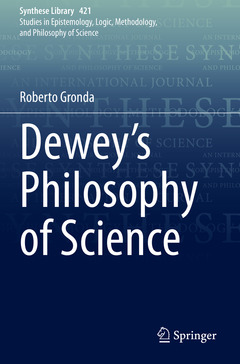Dewey's Philosophy of Science, 1st ed. 2020 Synthese Library Series, Vol. 421
Auteur : Gronda Roberto

First ?book-length study has ever been devoted to Dewey’s philosophy of science
Presents definite reference work for Deweyan and pragmatist scholarship on philosophy of science
Of interest to historians of philosophy and contemorary philosophers of science
Date de parution : 03-2021
Ouvrage de 218 p.
15.5x23.5 cm
Disponible chez l'éditeur (délai d'approvisionnement : 15 jours).
Prix indicatif 94,94 €
Ajouter au panierDate de parution : 03-2020
Ouvrage de 218 p.
15.5x23.5 cm
Disponible chez l'éditeur (délai d'approvisionnement : 15 jours).
Prix indicatif 94,94 €
Ajouter au panierThèmes de Dewey's Philosophy of Science :
Mots-clés :
Dewey Philosophy of Science; Dewey Logical constructivism; Dewey Metaphilosophical Science; Dewey Experience; Pragmatism Philosophy of Science; Dewey Language; Dewey Inquiry; Dewey Construction; Dewey Rationalism; Dewey Structural Realism; Dewey Reichenbach; Dewey Semantic Identity; Dewey semantics; Dewey semantic Externalism



